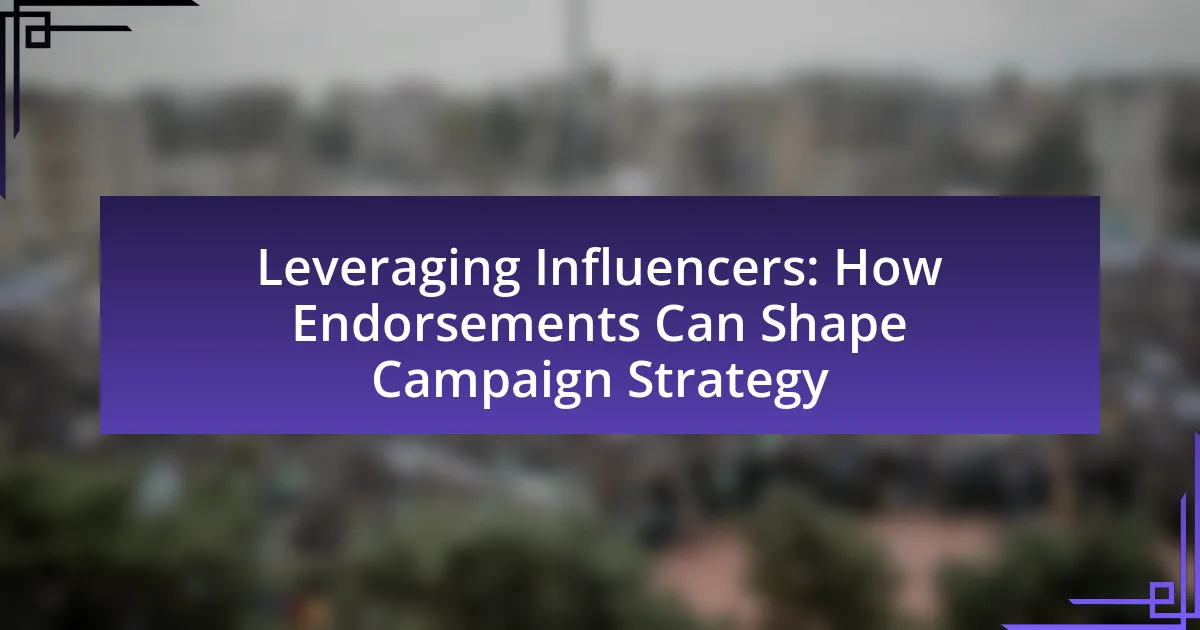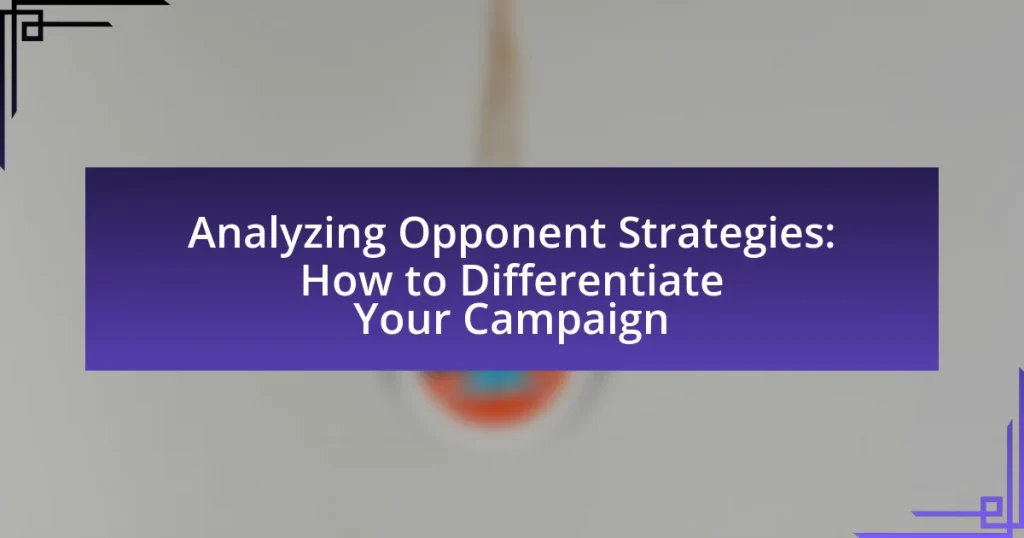Leveraging influencers in campaign strategy refers to the practice of utilizing individuals with substantial social media followings to promote brands or messages, capitalizing on their established trust and credibility. This article explores the impact of influencer endorsements on marketing campaigns, highlighting their ability to enhance brand visibility, engagement, and conversion rates compared to traditional advertising methods. It discusses the effectiveness of micro-influencers, the importance of authenticity, and the challenges brands face in selecting the right influencers and measuring campaign success. Additionally, it outlines best practices for building long-term relationships with influencers and adapting strategies based on their feedback, emphasizing the growing necessity of influencer marketing in today’s consumer landscape.

What is Leveraging Influencers in Campaign Strategy?
Leveraging influencers in campaign strategy involves utilizing individuals with significant social media followings to promote a brand or message. This approach capitalizes on the influencers’ established trust and credibility with their audience, which can lead to increased brand awareness and consumer engagement. According to a 2021 study by the Digital Marketing Institute, 49% of consumers depend on influencer recommendations when making purchasing decisions, highlighting the effectiveness of this strategy in driving sales and enhancing brand loyalty.
How do endorsements from influencers impact marketing campaigns?
Endorsements from influencers significantly enhance the effectiveness of marketing campaigns by increasing brand visibility and credibility. Influencers possess established trust with their followers, which translates into higher engagement rates and conversion potential for brands they endorse. For instance, a study by Nielsen found that 92% of consumers trust recommendations from individuals over brands, highlighting the persuasive power of influencer endorsements. Additionally, campaigns that incorporate influencer partnerships can achieve up to 11 times higher return on investment compared to traditional advertising methods, as reported by the Influencer Marketing Association. This demonstrates that influencer endorsements not only amplify reach but also foster consumer trust, ultimately driving sales and brand loyalty.
What types of influencers are most effective for endorsements?
Micro-influencers are the most effective for endorsements due to their high engagement rates and niche audiences. Research indicates that micro-influencers, typically defined as those with 1,000 to 100,000 followers, often achieve engagement rates of 3% to 10%, significantly higher than the 1% average seen with larger influencers. This heightened engagement translates to more authentic interactions and trust from their followers, making their endorsements more impactful. Additionally, brands that collaborate with micro-influencers report a return on investment that is 6.7 times higher than those working with traditional celebrities, demonstrating the effectiveness of this influencer type in driving consumer behavior.
How do influencer endorsements differ from traditional advertising?
Influencer endorsements differ from traditional advertising primarily in their approach to audience engagement and authenticity. Influencer endorsements leverage personal connections and trust built by influencers with their followers, resulting in higher engagement rates; for instance, studies show that influencer marketing can yield engagement rates up to 11 times higher than traditional advertising methods. Traditional advertising typically relies on broader, less personalized messaging through channels like television or print, which often leads to lower consumer trust and engagement. This distinction highlights the effectiveness of influencer marketing in creating relatable content that resonates with specific target audiences, thereby enhancing brand loyalty and conversion rates.
Why is influencer marketing becoming essential for brands?
Influencer marketing is becoming essential for brands because it effectively enhances brand visibility and credibility among target audiences. Influencers possess established trust and rapport with their followers, which allows brands to reach consumers in a more authentic and relatable manner. According to a 2021 survey by HubSpot, 61% of consumers trust influencer recommendations, highlighting the significant impact influencers have on purchasing decisions. This trust translates into higher engagement rates and conversion potential, making influencer marketing a vital strategy for brands aiming to connect with consumers in a crowded marketplace.
What trends are driving the growth of influencer marketing?
The growth of influencer marketing is primarily driven by the increasing consumer demand for authentic content and the rise of social media platforms. Consumers are increasingly seeking genuine connections with brands, leading to a preference for influencers who provide relatable and trustworthy endorsements. According to a 2021 survey by the Digital Marketing Institute, 49% of consumers rely on influencer recommendations when making purchasing decisions, highlighting the effectiveness of influencer marketing in shaping consumer behavior. Additionally, the expansion of platforms like TikTok and Instagram has created new opportunities for influencers to engage with audiences, further accelerating the trend.
How do consumer behaviors influence the effectiveness of endorsements?
Consumer behaviors significantly influence the effectiveness of endorsements by determining how receptive audiences are to the messages conveyed by influencers. When consumers trust an influencer, they are more likely to engage with the endorsed product, leading to higher conversion rates. Research indicates that 92% of consumers trust recommendations from individuals over brands, highlighting the importance of authenticity in endorsements. Additionally, consumer behaviors such as brand loyalty and social proof can amplify the impact of endorsements; for instance, when consumers observe their peers endorsing a product, they are more inclined to consider it credible. This interplay between consumer trust and influencer credibility ultimately shapes the success of marketing campaigns that utilize endorsements.
What challenges do brands face when leveraging influencers?
Brands face several challenges when leveraging influencers, including authenticity issues, audience alignment, and measurement of ROI. Authenticity is crucial; if an influencer’s audience perceives their endorsement as insincere, it can damage the brand’s reputation. For instance, a study by the Digital Marketing Institute found that 63% of consumers trust influencers more than brands, highlighting the importance of genuine partnerships. Audience alignment is another challenge; brands must ensure that the influencer’s followers match their target demographic to maximize engagement. Lastly, measuring ROI can be complex, as traditional metrics may not capture the full impact of influencer campaigns. According to a report by Influencer Marketing Hub, 49% of marketers struggle to measure the effectiveness of their influencer marketing efforts, indicating a significant hurdle for brands.
How can brands ensure authenticity in influencer partnerships?
Brands can ensure authenticity in influencer partnerships by selecting influencers whose values align with their own and who have a genuine connection with their audience. This alignment fosters trust, as consumers are more likely to engage with content that feels real and relatable. Research indicates that 61% of consumers trust influencer recommendations, highlighting the importance of authenticity in these partnerships. Additionally, brands should encourage influencers to create content in their own voice and style, which enhances credibility and resonates more effectively with followers.
What are the risks associated with influencer marketing?
The risks associated with influencer marketing include potential damage to brand reputation, lack of authenticity, and regulatory compliance issues. Brands may face backlash if an influencer engages in controversial behavior or if their values do not align with the brand’s image, leading to negative public perception. Additionally, influencers may not always represent products authentically, which can result in consumer distrust. Regulatory compliance is also a concern, as failure to disclose paid partnerships can lead to legal repercussions; for instance, the Federal Trade Commission mandates clear disclosure of sponsored content. These factors highlight the complexities and potential pitfalls of influencer marketing strategies.
How can brands effectively select the right influencers?
Brands can effectively select the right influencers by analyzing their audience demographics, engagement rates, and content relevance. This process involves identifying influencers whose followers align with the brand’s target market, ensuring that the influencer’s engagement metrics indicate an active and interested audience. For instance, a study by Influencer Marketing Hub found that influencers with a 3% engagement rate or higher are generally more effective in driving consumer action. Additionally, brands should assess the authenticity of the influencer’s content and their previous partnerships to ensure alignment with brand values and messaging. This strategic approach enhances the likelihood of successful influencer collaborations that resonate with the intended audience.
What strategies can enhance the impact of influencer endorsements?
To enhance the impact of influencer endorsements, brands should focus on selecting influencers whose values align with their own and who have a genuine connection with their audience. Research indicates that 92% of consumers trust recommendations from individuals over brands, highlighting the importance of authenticity in influencer partnerships. Additionally, utilizing data analytics to identify the right influencers based on engagement rates and audience demographics can significantly improve campaign effectiveness. Collaborating on creative content that resonates with the influencer’s style and audience further amplifies the endorsement’s reach and impact.
How can brands measure the success of influencer campaigns?
Brands can measure the success of influencer campaigns through key performance indicators (KPIs) such as engagement rates, reach, conversions, and return on investment (ROI). Engagement rates, which include likes, comments, and shares, indicate how well the audience interacts with the content. Reach measures the total number of unique users who see the campaign, providing insight into brand visibility. Conversions track the number of users who take a desired action, such as making a purchase or signing up for a newsletter, directly linked to the influencer’s promotion. ROI quantifies the financial return relative to the campaign’s cost, allowing brands to assess overall effectiveness. According to a 2021 study by Influencer Marketing Hub, businesses earn an average of $5.78 for every dollar spent on influencer marketing, highlighting the potential financial benefits of successful campaigns.
What role does audience engagement play in campaign effectiveness?
Audience engagement is crucial for campaign effectiveness as it directly influences the reach and impact of marketing efforts. Engaged audiences are more likely to share content, participate in discussions, and convert into customers, thereby amplifying the campaign’s message. Research indicates that campaigns with high audience engagement can achieve up to 6 times higher conversion rates compared to those with low engagement levels. This demonstrates that fostering interaction and connection with the audience not only enhances brand loyalty but also drives measurable results in campaign performance.
What are the best practices for leveraging influencers in campaigns?
The best practices for leveraging influencers in campaigns include selecting the right influencers, establishing clear objectives, and fostering authentic relationships. Selecting influencers whose audience aligns with the brand ensures that the message reaches the intended demographic, as studies show that 49% of consumers depend on influencer recommendations for their purchasing decisions. Establishing clear objectives, such as increasing brand awareness or driving sales, allows for measurable outcomes and effective campaign evaluation. Fostering authentic relationships with influencers encourages genuine endorsements, which can lead to higher engagement rates; research indicates that authentic influencer partnerships can yield up to 11 times higher ROI compared to traditional advertising methods.
How can brands build long-term relationships with influencers?
Brands can build long-term relationships with influencers by fostering genuine partnerships based on mutual trust and shared values. Establishing clear communication channels and providing consistent support helps maintain engagement over time. Research indicates that 61% of consumers trust influencer recommendations, highlighting the importance of authenticity in these relationships. By collaborating on multiple campaigns and involving influencers in product development, brands can create a sense of ownership and loyalty, further solidifying the partnership.
What common mistakes should brands avoid in influencer marketing?
Brands should avoid several common mistakes in influencer marketing, including selecting influencers solely based on follower count rather than engagement rates and audience alignment. Choosing influencers who do not resonate with the target demographic can lead to ineffective campaigns, as evidenced by a study from the Influencer Marketing Hub, which found that 63% of marketers believe audience engagement is more important than the number of followers. Additionally, failing to establish clear expectations and guidelines can result in miscommunication and unsatisfactory outcomes. According to a report by Mediakix, 70% of brands that set clear campaign objectives reported higher success rates. Lastly, neglecting to measure campaign performance can hinder future strategy adjustments; data from HubSpot indicates that 84% of marketers who track their influencer marketing ROI are more likely to succeed in their campaigns.
How can brands adapt their strategies based on influencer feedback?
Brands can adapt their strategies based on influencer feedback by analyzing the insights and engagement metrics provided by influencers regarding their products or campaigns. This feedback allows brands to identify consumer preferences, adjust messaging, and refine product offerings to better align with audience expectations. For instance, a study by the Digital Marketing Institute found that 70% of consumers are more likely to purchase a product endorsed by an influencer they trust, indicating that influencer feedback can significantly impact purchasing decisions. By leveraging this data, brands can enhance their marketing strategies, ensuring they resonate more effectively with their target audience.



